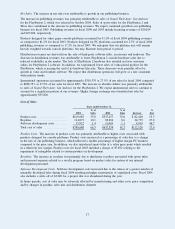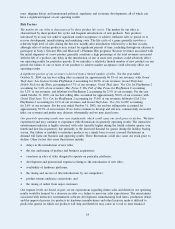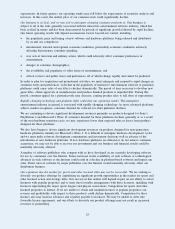2K Sports 2004 Annual Report Download - page 34
Download and view the complete annual report
Please find page 34 of the 2004 2K Sports annual report below. You can navigate through the pages in the report by either clicking on the pages listed below, or by using the keyword search tool below to find specific information within the annual report.
Our business is dependent on publishing arrangements with third parties. Our success depends on our ability
to identify and develop new titles on a timely basis. We have entered into agreements with third parties to
acquire the rights to publish and distribute interactive entertainment software. These agreements typically
require us to make advance payments, pay royalties and satisfy other conditions. Our advance payments may
not be sufficient to permit developers to develop new software successfully.
Software development costs, promotion and marketing expenses and royalties payable to software developers
have increased significantly in recent years, and reduce potential profits derived from sales of our software.
We expect that the costs associated with the development of next generation software will increase
significantly. Future sales of our titles may not be sufficient to recover advances to software developers, and
we may not have adequate financial and other resources to satisfy our contractual commitments. If we fail to
satisfy our obligations under agreements with third-party developers, the agreements may be terminated or
modified in ways that may be burdensome to us.
Returns of our published titles and price concessions may adversely affect our operating results. We are
exposed to the risk of product returns and price concessions with respect to our customers. Our distribution
arrangements with customers generally do not give them the right to return titles to us or to cancel firm
orders. However, we sometimes accept product returns from our distribution customers for stock balancing
and negotiate accommodations to customers which include credits and returns, when demand for specific
products falls below expectations. We accept returns and grant price concessions in connection with our
publishing arrangements. Revenue is recognized after deducting estimated reserves for returns and price
concessions. We believe that we can reliably estimate future returns and price concessions. However, if
return rates and price concessions for our published titles exceed our reserves, our revenues will decline.
The interactive entertainment software industry is highly competitive. We compete for both licenses to
properties and the sale of interactive entertainment software with Sony, Microsoft and Nintendo, each of
which is a large developer and marketer of software for its own platforms. Each of these competitors has
the financial resources to withstand significant price competition and to implement extensive advertising
campaigns, particularly for prime-time television spots. These companies may also increase their own software
development efforts or focus on developing software products for third-party platforms. We also compete with
domestic companies such as Electronic Arts, Activision, THQ, Midway Games and Atari and international
companies such as SEGA, Vivendi, Ubi Soft, Eidos, Capcom, Konami and Namco. Some of our competitors
have greater financial, technical, personnel and other resources than we do, and are able to carry larger
inventories and make higher offers to licensors and developers for commercially desirable properties than we
can. Our titles also compete with other forms of entertainment such as motion pictures, television and audio
and video products featuring similar themes, online computer programs and forms of entertainment which may
be less expensive or provide other advantages to consumers.
Our distribution business also operates in a highly competitive environment. The intense competition that
characterizes our industry is based primarily on breadth, availability and quality of product lines; price; terms
and conditions of sale; credit terms and availability; speed and accuracy of delivery; and effectiveness of sales
and marketing programs. Our competitors include regional, national and international distributors, as well
as hardware manufacturers and software publishers. We may lose market share or be forced in the future to
reduce our prices in response to the actions of our competitors, and thereby experience a reduction in our
gross margins.
Increased competition for limited shelf space and promotional support from retailers could affect the success
of our business and require us to incur greater expenses to market our titles. Retailers have limited shelf
space and promotional resources, and competition is intense among an increasing number of newly introduced
interactive entertainment software titles for adequate levels of shelf space and promotional support.
Competition for retail shelf space is expected to increase, which may require us to increase our marketing
expenditures to maintain current levels of sales of our titles. Competitors with more extensive lines and
popular titles may have greater bargaining power with retailers. Accordingly, we may not be able to achieve
the levels of promotional support and shelf space that such competitors receive.
A limited number of customers account for a significant portion of our sales. Sales to our five largest
customers accounted for approximately 38.9% and 38.6% of our revenues, respectively, for the years ended
26
























